Related Research Articles

The oldest known surviving film was shot in the United Kingdom as well as early colour films. While film production reached an all-time high in 1936, the "golden age" of British cinema is usually thought to have occurred in the 1940s, during which the directors David Lean, Michael Powell, and Carol Reed produced their most critically acclaimed works. Many British actors have accrued critical success and worldwide recognition, such as Audrey Hepburn, Olivia de Havilland, Vivien Leigh, Glynis Johns, Maggie Smith, Laurence Olivier, Michael Caine, Sean Connery, Ian Mckellen, Joan Collins, Judi Dench, Julie Andrews, Daniel Day-Lewis, Gary Oldman, Emma Thompson, Anthony Hopkins, Peter O’Toole and Kate Winslet. Some of the films with the largest ever box office returns have been made in the United Kingdom, including the fourth and fifth highest-grossing film franchises.
A British sitcom or a Britcom is a situational comedy programme produced for British television.
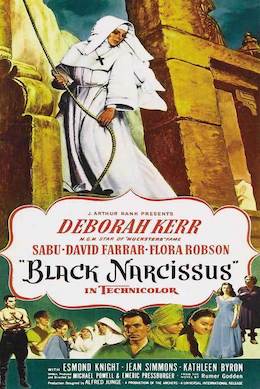
Black Narcissus is a 1947 British psychological drama film jointly written, directed and produced by Michael Powell and Emeric Pressburger, based on the 1939 novel by Rumer Godden. It stars Deborah Kerr, Sabu, David Farrar, and Flora Robson, and features Esmond Knight, Jean Simmons, and Kathleen Byron.
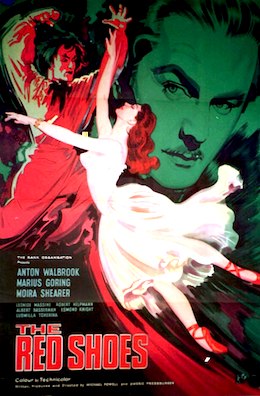
The Red Shoes is a 1948 British drama film written, produced and directed by Michael Powell and Emeric Pressburger. It follows Victoria Page, an aspiring ballerina who joins the world-renowned Ballet Lermontov, owned and operated by Boris Lermontov, who tests her dedication to the ballet by making her choose between her career and her romance with composer Julian Craster.

Sir David Lean was an English film director, producer, screenwriter, and editor, widely considered one of the most important figures of British cinema. He directed the large-scale epics The Bridge on the River Kwai (1957), Lawrence of Arabia (1962), Doctor Zhivago (1965), Ryan's Daughter (1970), and A Passage to India (1984). He also directed the film adaptations of Charles Dickens novels Great Expectations (1946) and Oliver Twist (1948), as well as the romantic drama Brief Encounter (1945).

Michael Latham Powell was an English filmmaker, celebrated for his partnership with Emeric Pressburger. Through their production company The Archers, they together wrote, produced and directed a series of classic British films, notably The Life and Death of Colonel Blimp (1943), A Canterbury Tale (1944), I Know Where I'm Going! (1945), A Matter of Life and Death, Black Narcissus (1947), The Red Shoes (1948) and The Tales of Hoffmann (1951).

Emeric Pressburger was a Hungarian-British screenwriter, film director, and producer. He is best known for his series of film collaborations with Michael Powell, in a collaboration partnership known as the Archers, and produced a series of films, including 49th Parallel, The Life and Death of Colonel Blimp (1943), A Matter of Life and Death, Black Narcissus (1947), The Red Shoes (1948), and The Tales of Hoffmann (1951).

Kind Hearts and Coronets is a 1949 British crime black comedy film directed by Robert Hamer. It features Dennis Price, Joan Greenwood, Valerie Hobson and Alec Guinness; Guinness plays eight characters. The plot is loosely based on the novel Israel Rank: The Autobiography of a Criminal (1907) by Roy Horniman. It concerns Louis D'Ascoyne Mazzini, the son of a woman disowned by her aristocratic family for marrying out of her social class. After her death, a vengeful Louis decides to take the family's dukedom by murdering the eight people ahead of him in the line of succession to the title.

A Matter of Life and Death is a 1946 British fantasy-romance film set in England during World War II.
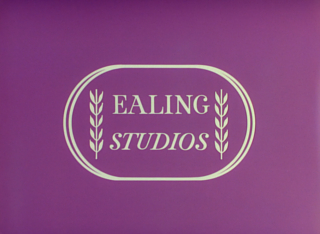
The Ealing comedies is an informal name for a series of comedy films produced by the London-based Ealing Studios during a ten-year period from 1947 to 1957. Often considered to reflect Britain's post-war spirit, the most celebrated films in the sequence include Kind Hearts and Coronets (1949), Whisky Galore! (1949), The Lavender Hill Mob (1951), The Man in the White Suit (1951) and The Ladykillers (1955). Hue and Cry (1947) is generally considered to be the earliest of the cycle, and Barnacle Bill (1957) the last, although some sources list Davy (1958) as the final Ealing comedy. Many of the Ealing comedies are ranked among the greatest British films, and they also received international acclaim.

The British Film Institute (BFI) is a film and television charitable organisation which promotes and preserves film-making and television in the United Kingdom. The BFI uses funds provided by the National Lottery to encourage film production, distribution, and education. It is sponsored by the Department for Culture, Media and Sport, and partially funded under the British Film Institute Act 1949.
The BFI TV 100 is a list of 100 television programmes or series that was compiled in 2000 by the British Film Institute (BFI), as chosen by a poll of industry professionals, with the aim to determine the best British television programmes of any genre that had been screened up to that time.

Nineteen Eighty-Four is a British television adaptation of the 1949 novel of the same name by George Orwell, originally broadcast on BBC Television in December 1954. The production proved to be hugely controversial, with questions asked in Parliament and many viewer complaints over its supposed subversive nature and horrific content. It starred Peter Cushing, Yvonne Mitchell, Donald Pleasence and André Morell.

The Wednesday Play is an anthology series of British television plays which ran on BBC1 for six seasons from October 1964 to May 1970. The plays were usually original works written for television, although dramatic adaptations of fiction also featured. The series gained a reputation for presenting contemporary social dramas, and for bringing issues to the attention of a mass audience that would not otherwise have been discussed on screen.
Sight and Sound is a monthly film magazine published by the British Film Institute (BFI). Since 1952, it has conducted the well-known decennial Sight and Sound Poll of the Greatest Films of All Time.
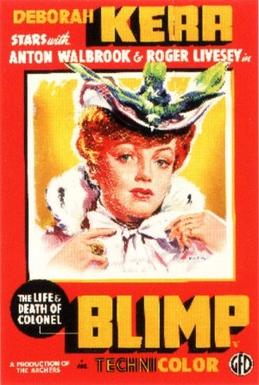
The Life and Death of Colonel Blimp is a 1943 British romantic-war film written, produced and directed by the British film-making team of Michael Powell and Emeric Pressburger. It stars Roger Livesey, Deborah Kerr and Anton Walbrook. The title derives from the satirical Colonel Blimp comic strip by David Low, but the story is original. Although the film is strongly pro-British, it is a satire on the British Army, especially its leadership. It suggests that Britain faced the option of following traditional notions of honourable warfare or to "fight dirty" in the face of such an evil enemy as Nazi Germany.

The British film-making partnership of Michael Powell (1905–1990) and Emeric Pressburger (1902–1988)—together often known as The Archers, the name of their production company—made a series of influential films in the 1940s and 1950s. Their collaborations—24 films between 1939 and 1972—were mainly derived from original stories by Pressburger with the script written by both Pressburger and Powell. Powell did most of the directing while Pressburger did most of the work of the producer and also assisted with the editing, especially the way the music was used. Unusually, the pair shared a writer-director-producer credit for most of their films. The best-known of these are The Life and Death of Colonel Blimp (1943), A Canterbury Tale (1944), I Know Where I'm Going! (1945), A Matter of Life and Death (1946), Black Narcissus (1947), The Red Shoes (1948), and The Tales of Hoffmann (1951).
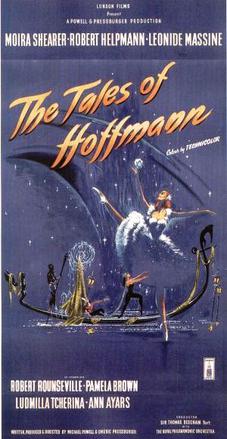
The Tales of Hoffmann is a 1951 British Technicolor comic opera film written, produced and directed by the team of Michael Powell and Emeric Pressburger working under the umbrella of their production company The Archers. It is an adaptation of Jacques Offenbach's 1881 opera The Tales of Hoffmann, itself based on three short stories by E. T. A. Hoffmann.
In February 2011 Time Out surveyed 150 film industry experts to produce its list of "The 100 best British films." Nicolas Roeg's Don't Look Now topped the list. An updated list was published in May 2021, retaining the same rankings but adding four films in place of Listen to Britain, Penda's Fen, I'm All Right Jack, and School for Scoundrels.
References
- ↑ BBC. 23 September 1999. Entertainment: Best 100 British films – full list. Accessed 30 January 2014.